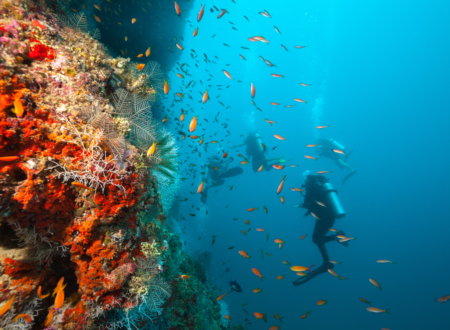Scuba Diving Beginner’s Guide
Taking the plunge into the world of scuba diving can be both exciting and intimidating for beginners. But fear not, we’re here to help you prepare for your first try scuba diving session. In this article, we’ll go over the do’s and don’ts to ensure you have a safe and enjoyable underwater experience.
Before Your Dive
Choose a Reputable Dive Center
Your safety and comfort during your try scuba diving session depend on the quality of the dive center you choose. Do your research, read reviews, and ensure that the center is affiliated with a recognized certification agency like PADI or SSI.
Understand the Basics

Familiarize yourself with basic diving concepts, such as buoyancy, equalization, and hand signals. This will help you feel more confident and better prepared when you’re underwater. At Bermuda Diving Center, the try diving diving experience consist of 2 training sessions (classroom briefing and practical training in the shallow water) to make sure the try diver is confident and familiar with the scuba gear and the basics before the actual dive.
Medical Check-up
Ensure that you are in good health before diving. If you have any pre-existing medical conditions, consult your doctor to confirm that it’s safe for you to participate in scuba diving activities.

Do’s and Don’ts
Do’s
- Stay Hydrated: Drink plenty of water before and after your dive. Proper hydration helps reduce the risk of decompression sickness.
- Eat Light: Consume a light meal a couple of hours before your dive. Avoid heavy meals or overeating, as it may cause discomfort or nausea during your dive.
- Listen to Your Instructor: Pay close attention to your instructor’s pre-dive briefing and follow their guidance. They are there to ensure your safety and enjoyment.
- Ask Questions: If you’re unsure about anything or feel nervous, don’t hesitate to ask your instructor. They are there to help and support you.
- Equalize Early and Often: To prevent discomfort or injury to your ears, equalize frequently during your descent by pinching your nose and gently blowing out.
Don’ts
- Don’t Drink Alcohol: Refrain from consuming alcohol before your dive, as it can impair your judgment and increase your risk of decompression sickness.
- Don’t Hold Your Breath: Holding your breath while diving can lead to lung overexpansion injuries. Remember to breathe slowly and continuously.
- Don’t Touch Marine Life: Avoid touching, feeding, or disturbing marine life during your dive. Be a responsible diver and respect the underwater environment.
- Don’t Dive if You’re Unwell: If you’re feeling unwell or experiencing any cold or flu symptoms, reschedule your dive. Diving while sick can be dangerous and uncomfortable.
After Your Dive
- Log Your Dive: Start a dive log to record your experiences, including the date, location, and dive site. This will help you keep track of your progress and serve as a reminder of your underwater adventures.
- Take Time to Relax: Allow your body to recover after your dive by relaxing and hydrating. Avoid strenuous activities or flying for at least 18-24 hours after your dive to minimize the risk of decompression sickness.
- Share Your Experience: Connect with other divers and share your experience. This can help build your confidence, expand your diving network, and encourage you to continue your scuba diving journey.
- Consider Further Education: If you enjoyed your try scuba diving session, consider enrolling in a scuba certification course. Becoming a certified diver opens up a world of underwater opportunities and allows you to dive independently with a buddy.
Dive into Your First Try Scuba Diving Session with Confidence
By following these guidelines and preparing adequately, you can ensure a safe and enjoyable first try scuba diving experience. Remember to choose a reputable dive center, stay informed about the basics, and follow the do’s and don’ts for a smooth and unforgettable underwater adventure. Now that you’re prepared, it’s time to dive in and explore the wonders of the ocean!





